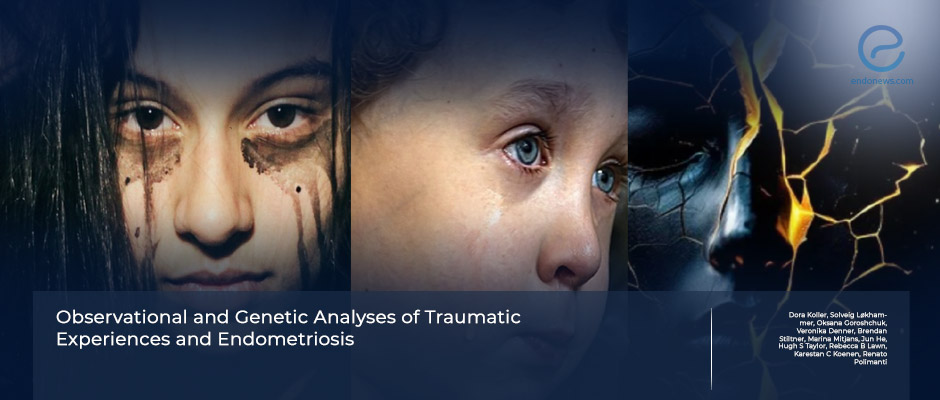Traumatic experiences in early life and later developement of endometriosis.
Apr 11, 2025
Genetic and observational analyses of the cases to assess the relationship between trauma and endometriosis.
Key Points
Importance:
- Although psychological trauma has been linked to endometriosis, limited data exist on the influence of trauma type and genetic predisposition.
- This study integrates observational and genetically informed analyses to clarify the relationship between trauma and endometriosis.
Highlights:
- Taking sociodemographic variation into account, women with endometriosis were more likely to report both childhood and adulthood traumatic experiences.
- Contact trauma, emotional and physical abuse, and sexual trauma were significantly more prevalent among endometriosis cases than controls.
What's done here:
- This large multicenter case-control study aimed to examine associations between traumatic experiences and endometriosis using both phenotypic and genetic analyses.
- Data were collected from the UK Biobank (8276 endometriosis and 240,117 controls), supplemented with meta-analysis data from European and East Asian ancestries, and the FinnGen cohort.
- A mental health questionnaire was administered in the UK Biobank to assess trauma exposure.
- Latent class analysis (LCA) was applied to identify trauma experience patterns across cases and controls.
- Polygenic risk scoring (PRS) and genetic correlation analyses were performed to evaluate pleiotropy between trauma and endometriosis.
Key Results:
- Women with endometriosis were significantly more likely to report traumatic experiences compared to controls.
- LCA identified higher rates of emotional/physical trauma and sexual trauma in endometriosis cases.
- Higher polygenic risk scores were associated with increased odds of endometriosis, but no interaction was found between genetic risk and trauma exposure.
- The observed association between trauma and endometriosis appeared independent of genetic predisposition.
Lay Summary
Endometriosis is a chronic, progressive condition affecting 10–15% of women worldwide, yet current treatment options remain limited, and diagnostic tools are inadequate. This shortfall stems largely from an incomplete understanding of its underlying pathophysiology. In recent years, researchers have begun to explore the psychosocial dimensions of the disease, particularly its potential association with early-life trauma. Childhood maltreatment—including emotional neglect and sexual abuse—has long been recognized as a risk factor for poor mental health outcomes in adulthood and may also contribute to endometriosis susceptibility.
In a recent study published in JAMA Psychiatry, Koller et al. from the Department of Psychiatry at Yale School of Medicine investigated the link between traumatic experiences and endometriosis, using both observational data and genetically informed analyses.
The researchers first examined self-reported data from 8276 women with endometriosis and 240,117 controls enrolled in the UK Biobank. Participants completed an online mental health questionnaire assessing 16 different traumatic and stressful life events—including physical abuse, sexual assault, intimate partner violence, childhood neglect, and life-threatening accidents.
Women with endometriosis were significantly more likely to report both emotional/physical trauma and sexual trauma than controls (p < 0.01 and p = 0.003, respectively).
In the next phase, the team conducted genome-wide association analyses using data from the GWAS meta-analysis and FinnGen cohort, exploring genetic correlations and polygenic risk scores (PRS). They found significant genetic pleiotropy between endometriosis and trauma-related outcomes such as post-traumatic stress disorder (PTSD) and childhood maltreatment. However, when incorporating both genetic risk and trauma into a multivariable model, only endometriosis PRS remained significantly associated with the disease, suggesting that trauma may exert an influence independent of genetic predisposition.
In conclusion, the authors propose that future endometriosis screening strategies should consider genetic risk, contact trauma history, and other psychosocial factors to better identify at-risk individuals and improve early diagnosis.
Research Source: https://pubmed.ncbi.nlm.nih.gov/39908042/
genetic predisposition posttravmatic stress order phenotype sexual trauma observational analyses endometriosis.
